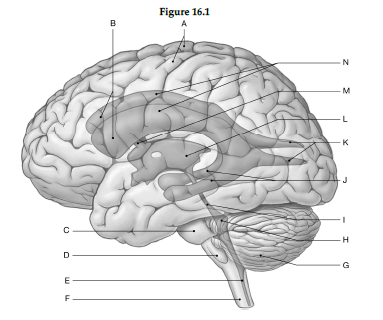Using the figure below, identify the labeled part.

1) Label A: ______________________________
2) Label B: ______________________________
3) Label C: ______________________________
4) Label D: ______________________________
5) Label E: ______________________________
6) Label F: ______________________________
7) Label G: ______________________________
8) Label H: ______________________________
9) Label I: ______________________________
10) Label J: ______________________________
11) Label K: ______________________________
12) Label L: ______________________________
13) Label M: ______________________________
14) Label N: ______________________________
1) Cerebral hemispheres
2) Anterior horns of lateral ventricles
3) Pons
4) Medulla oblongata
5) Central canal
6) Spinal cord
7) Cerebellum
8) Fourth ventricle
9) Aqueduct of midbrain
10) Inferior horns of lateral ventricles
11) Posterior horns of lateral ventricles
12) Third ventricle
13) Interventricular foramen
14) Lateral ventricles
You might also like to view...
____________________ is commonly known as earwax
Fill in the blank(s) with correct word
The term "physiology" is related to
A) the structure of internal organs. B) the Greek for "relationship to nature." C) the Greek for "cutting up." D) the Latin for "physical shape."
Astrocytes structurally support neurons and also provide important signals and nutrients
to neurons. Indicate whether the statement is true or false
In what form does thrombin normally exist in the plasma?
a. fibrinogen b. protothrombin c. prothrombin d. prethrombin e. thrombin stabilizing factor